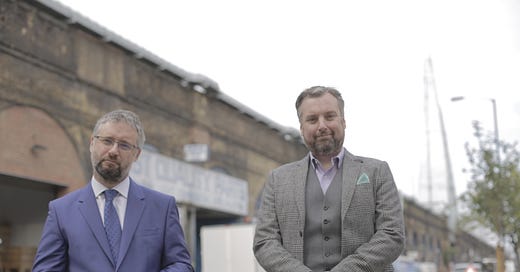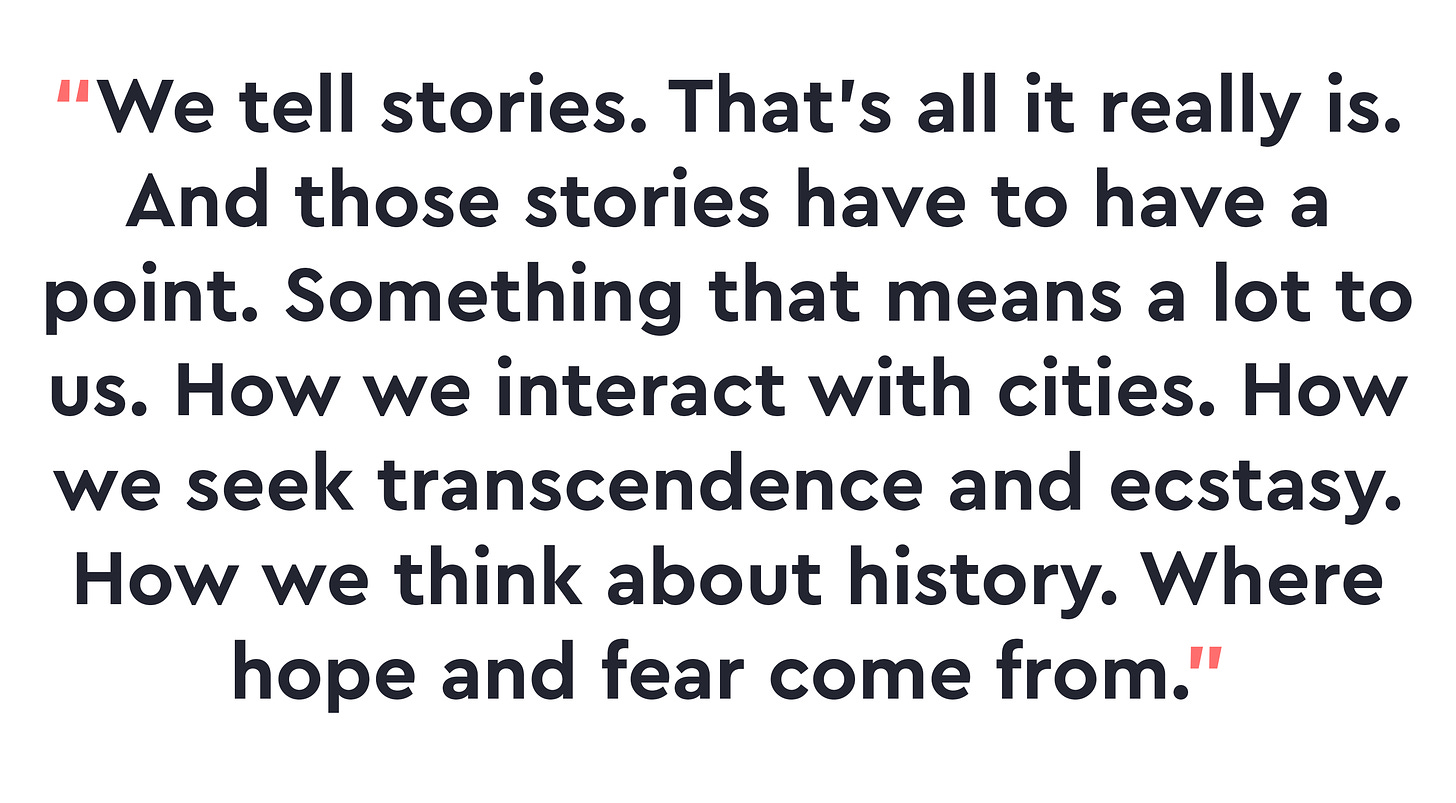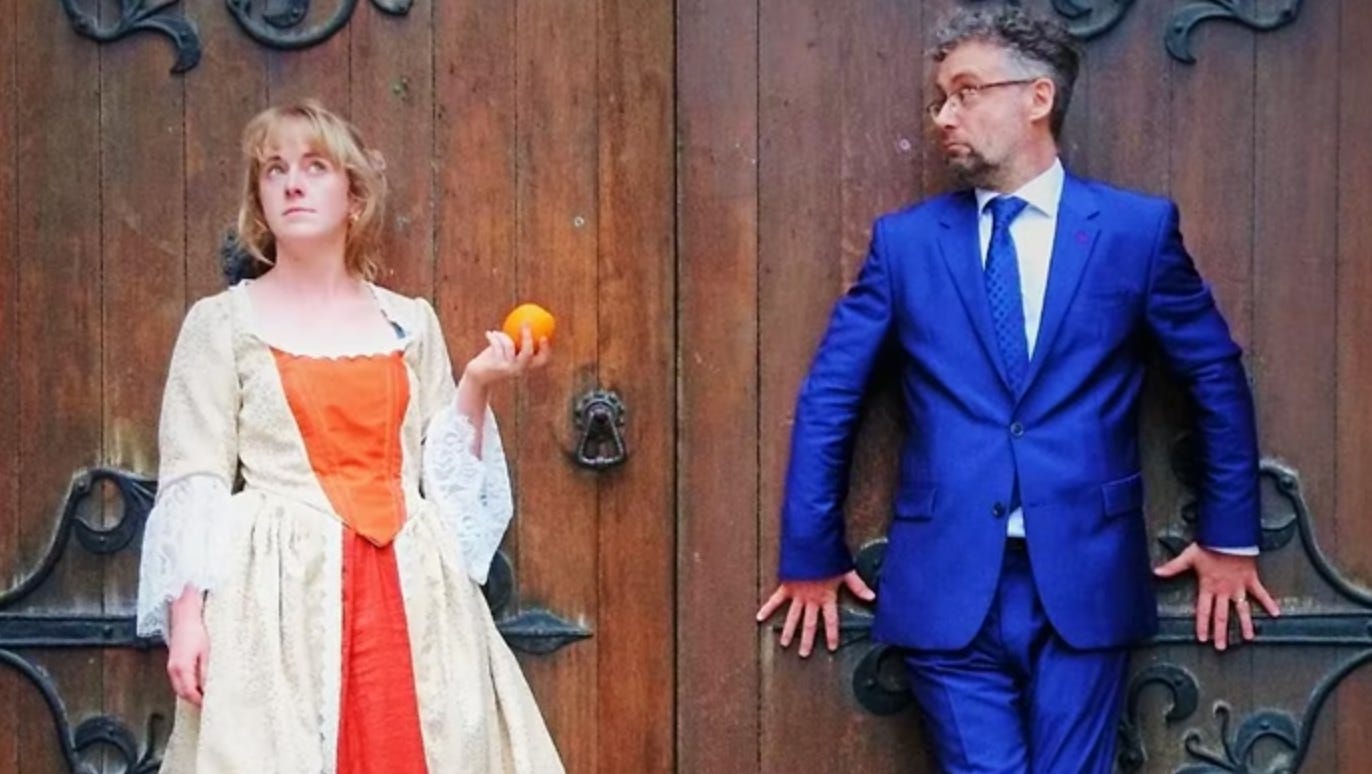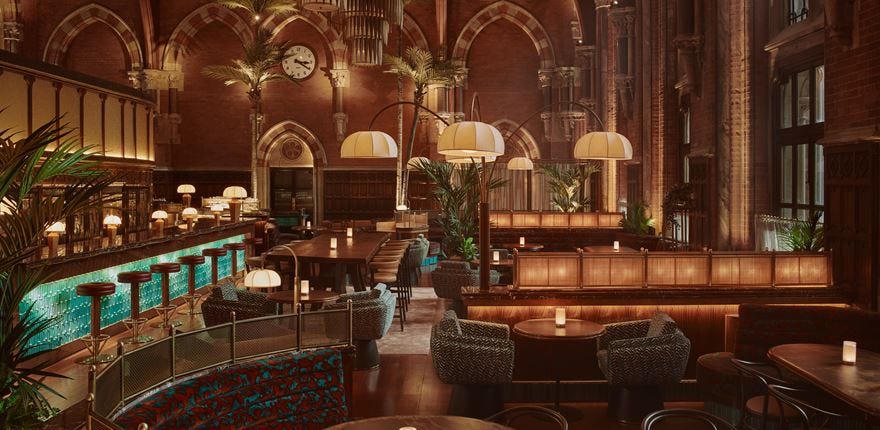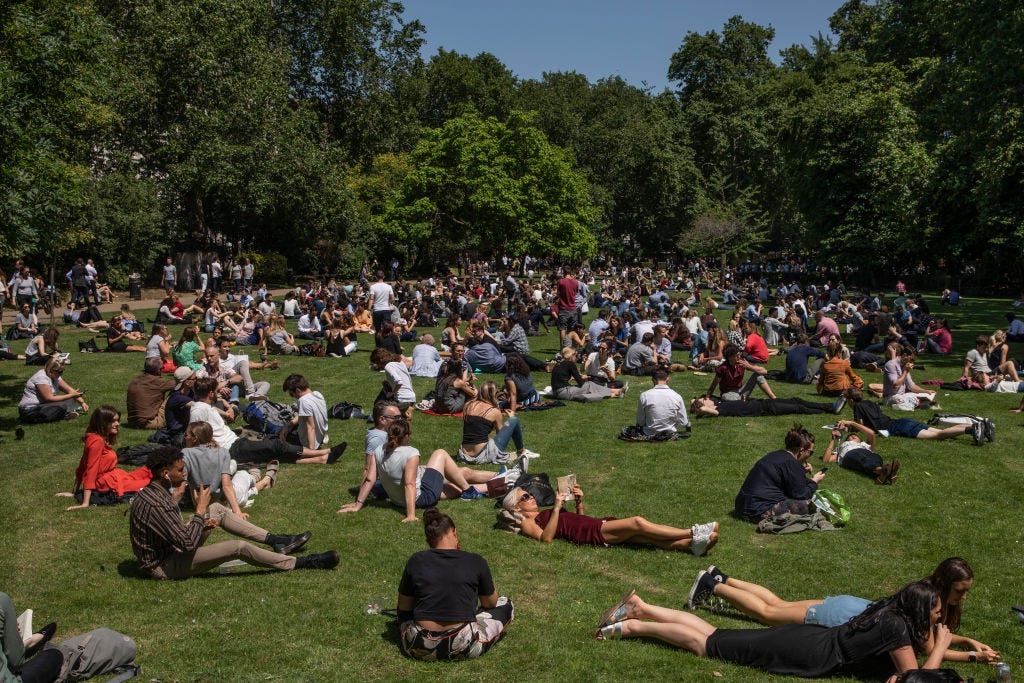Where Do You Go? with Minimum Labyrinth
The strolling storytellers on pubs, pasta and public parks
Every now and again we like to ask people for their personal take on London. We get them to tell us the places in the city that they turn to for different reasons: the spots that excite them, inspire them, make them feel calm, happy or just make them want to spend money. We call it ‘Where do you go?’.
This week it’s the turn of Robert Kingham (above, left) and Rich Cochrane (right) who, collectively, form Minimum Labyrinth, a creative partnership that has spawned walking tours, audio dramas, documentary films and books; most of which focus on the weirder, more marginal corners of London’s history.
Having participated in some Minimum Labyrinthian experiences ourselves, we thought the pair would make a good subject for Where Do you Go? so we sat them down and forced them to explain why pubs are so important to them, to reveal the location of their most treasured plate of spaghetti, and (true to form) name their favourite cemetery.
Who are you?
Robert: I’m Robert Kingham.
Rich: And I’m Rich Cochrane.
And why should we trust you?
Robert: I’m a Londoner - Redbridge-born and now living in Hither Green – and I’m one half of Minimum Labyrinth. We lead walks, we write books, we make films, we record audio dramas, and lots of these draw on London as an inexhaustible source of inspiration.
Rich: I’m an immigrant; I grew up in Liverpool, lived in Cardiff for a while and now live not far from Robert in London’s fashionable Catford quarter. I’ve lived in London about 25 years. I’m the other half of Minimum Labyrinth. You shouldn’t trust anything I say though.
How do you describe Minimum Labyrinth? You do walking tours, but you’re much more than that. You do immersive experiences, but everything is these days. Were you immersive before it was cool?
Robert: We like to imagine that our souls are restless, torn and battered by modernity, and that this drives us to seek solace in as many different genres and media as possible. We keep threatening to have a crack at a massive oil painting next.
Rich: This would be bad.
Robert: The reality is that we start with ideas about the stories we want to tell, and then we work out how best to tell those stories. That leads us down various paths.
Rich: It started in 2009 with Align, an illustrated talk with music, and it’s branched out into walks, books, films, audio dramas and whatever our budget stretches to.
Robert: I suppose what we do is immersive. I wouldn’t like to advertise it as such in case people think we issue VR headsets with scratch’n’sniff cards. It’s often intense, in that we like to bombard you with information and little surprises, but it can’t just be cacophony. Plot, structure, theme and connections are all vital.
Rich: I think the whole immersive theatre thing is different, it’s primarily experiential and I’m suspicious of its tendency to bombard the audience and drive them towards certain responses. If it’s about ideas, the expectation is that you’ll come to them through experiencing an intense focus. We don’t really do intense focus. It’s a lot more about slowly putting fragments together as a way to make sense of them. We’d rather the audience have time to do some of that for themselves. You have to create enough room for that to happen.
Robert: We tell stories. That’s all it really is. And those stories have to have a point. Something that means a lot to us. How we interact with cities. How we seek transcendence and ecstasy. How we think about history. Where hope and fear come from.
Where does this fascination with the darker, more mysterious side of London come from? Were you troubled children?
Robert: No. ‘They tuck you up, your Mum and Dad’, wrote Adrian Mitchell, and that was me. For me it stems from Peter Ackroyd’s Biography of London, which led me to the works of Arthur Machen. Our friend Phil O’Donnell – master mathematician, drummer and voice artist – forced Alan Moore’s From Hell on me. That whole psychogeographic world did fascinate me – and I still find it beautiful – but I now tread carefully. It can foster a very solipsistic and conservative view of cities, and of the world. London has been continually renewing itself, sometimes banally, sometimes sublimely, for two thousand years. It has no time for your melancholic ennui. I have, though, made efforts to inflict a troubled childhood on my two daughters, to give them what I never had, so they become great novelists.
Rich: I think Minimum Labyrinth productions have always been optimistic and celebratory. We don’t do Ripper tours. I spent a chunk of my childhood reading ghost stories and unsolved mysteries or watching age-inappropriate films on the little portable TV in my bedroom. But in the last couple of decades dystopias became completely dominant; the only futures we could imagine seemed to be bleak and a certain cynicism went with that. By believing only in a grimdark future we have, inevitably, started to manifest it in our politics; and so, once more, a lot of people are now pushing against that. Spooks and mysteries, in that context, can stand in for possibilities that are radically different from our present material conditions.
Is it important for all of your tours to include a pub stop?
Robert: Yes. More than one. Olive oil makes tomatoes easier for the gut to absorb nutrients. Beer makes history easier to absorb. It also relaxes the muscles if one is trying to hitch-hike onto a Vogon ship.
Rich: Having said all that, some people come on our walks, lay off the sauce, and have a great time. It’s not as if our walks are hen nights.
Robert: The pubs themselves are often part of the history of the area – some with a mediaeval pedigree – and I do love their glamour and charm. Some of the Victorian décor is meant to look misleadingly older, and that’s true of much London architecture.
Rich: And public spaces are really important to anywhere that packs humans densely together. The public house has served that purpose for a very long time; open spaces are all very well when it’s not cold or raining, but how many days a year is that again? If you want to understand a place, visit its pubs.
Robert: The pub stops do offer something else, too, besides the basic functional pleasures (which cannot be undervalued) of a piss, a pint, and a pew. They also give you a chance to process all the stories we will have just been belabouring your mind with, to reflect on what they mean, how they apply to modern London, and how they apply to your own life. One of the tremendous aspects of leading these walks is the stories that people start to tell me, and the others. History acts as spring rain, mixing memory and desire, stirring dull roots. There has not been a walk where I have not heard a completely new story about an area.
Rich: This is why a walk has to have stops. You can’t just march people from one thing to another telling them about it, then send them home. Well, you can, but you shouldn’t. Even if you go to see a movie, which is a bit like that, everyone knows you should go for a beer or a meal afterwards so you can talk about it and around it and go off on weird tangents inspired by it. That’s where a lot of the good stuff happens.
What would you say is your favourite London story, the one you pull out at dinner parties?
Robert: Bleak House.
Rich: Well, if I have to choose a Dickens it would be The Muppet Christmas Carol.
Are there any stories/neighbourhoods that you would love to give the ML treatment, but haven’t been able to yet?
Robert: All of them. Soon I will have found the elixir of immortality and get round to all of them. In the meantime we are picking them off slowly. The old marshland village of Lambeth is next in our sights.
Rich: Yes, it’s our instinct that any area of London (or any suitably old, well-documented place) is worth digging into.
What’s next for Minimum Labyrinth?
Robert: We’re running some London walks in September (Drury Lane, The Unburied Corner of London (above) and The Pantheon of Pancras) and our legendary annual coach trip from London to Rendlesham Forest in December. We’re busy editing A Fragment of Life, our full-cast audio drama adaptation of Arthur Machen’s 1906 novel about a London couple’s mystical journey, ready for release in the autumn. Next year is Arthur Machen’s 160th birthday – or it would have been – and so we want to run some more performances of The Thin Veil of London, which slips into Machen’s world on the streets of Holborn. I’m also thinking of adapting its prequel, The Grey Soul of London, into an audiobook walk. Quite a few people have entreated me to try this. I’ve resisted because our events are wonderfully communal, convivial things, and I kind of don’t want to be the guy encouraging people to explore London in a solitary manner. It fits with the subject matter though – this young penniless Welsh journalist tramping the grey streets and unloosing his imagination – and people can always do it in couples or groups. It gives us more scope to tell stories in different ways, too.
On to the usual questions... Where do you go that can never close down, because if it does you might cry?
Robert: St Pancras International. It’s my umbilical cord to the continent. I love my country but its island mentality can often get too much to bear. A different viewpoint is a massive tonic. Belgium is my holodeck.
Rich: Ciao Bella on Lamb’s Conduit Street (above). It’s just a perfect 1970s-style Italian trattoria. I know there are other places like it but somehow when Ciao Bella goes it’ll feel as if the twenty-first century has finally won. Until that day I will never not want to eat there when I’m in the vicinity.
Where do you go to impress someone?
Robert: For a cocktail in the bar of the St Pancras Renaissance Hotel (above). It’s a ticket to a portal that allows you a glimpse into George Gilbert Scott’s sumptuous architectural fantasy world.
Rich: Knight’s Bar in Simpson’s in the Strand. You can cosplay as a Sherlock Holmes villain and play a bit of chess. Nobody will care how bad you are at it.
Where do you go to be romantic?
Robert: The river. It’s the dark swirling timelessness of the water. I proposed to my wife on Blackfriars Bridge.
Rich: Le Garrick on Garrick Street if you mean the going-on-a-date kind of romantic. If you mean capital-R Romantic then Nunhead Cemetery (above) is my top spot for brooding upon mortality and whatnot. Next thing you know you’ll have composed an elegy, like a tedious clergyman in a Jane Austen novel.
Where do you go to get inspired?
Robert: Anywhere new. One of the pleasures of researching a walk is wandering wide-eyed around an unknown corner.
Where do you go to think?
Robert: Amidst the London collection shelves of the Guildhall Library.
Rich: It’s difficult to get a comfortable place to sit and a bit of quiet in town, and I think most of us have developed the habit of carrying a notebook and just perching and scribbling wherever we can. Sharing a bit of lunch with the crows in Lincoln’s Inn Fields (above) is usually a safe bet, though.
You can find Minimum Labyrinth on Twitter and on Instagram. Their Facebook page is here.
If you know of anyone that you think would make a good interview for our ‘Where do you go?’ series then let us know on Londoninbits@gmail.com.

